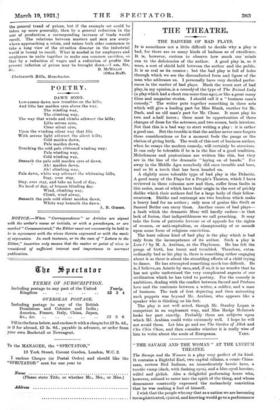THE THEATRE.
1.11/: BADNESS OF BAD PLAYS.
IT is sometimes not a little difficult to decide why a play is bad, for there are as many kinds of badness as of excellence. It is, however, curious to observe how much our minds run to the deficiencies of the author. A good play is, as it were, a sort of shield held between the author and the public. It is as real as its creator ; but the bad play is full of holes through which we see the discomforted form and figure of the man who addresses us. I personally have very decided prefer- ences in the matter of bad plays. Much the worst sort of bad play, in my opinion, is a comedy of the type of The Ruined Lady (a playwhich had a short run some time ago), or like a great many films and magazine stories. I should call it a " business man's comedy." The writer puts together something in three acts which will give a leading part for Miss Blank, another for Mr. Dash, and an old man's part for Mr. Chose. It must play its two and a-half hours ; there must be opportunities of three changes of dress for the actresses, and two scenes, both interiors. Not that this is a bad way to start writing a play : it is rather a good one. But the trouble is that the author never once forgets these considerations or for a moment feels the pangs or the elation of giving birth. The work of this sort of business author, when he essays the modern comedy, will certainly be atrocious. It can only be tolerable if he is in the line of a good tradition. Melodramas and pantomimes are written like this, but they are in the line of the dramatic " laying on of hands." Far away in the Middle Ages somebody did once tremble and burr, and so lit a torch that has been handed on.
A slightly more tolerable type of bad play is the Didactic.
A good many of the Plays for a People's Theatre, which I have reviewed in these columns now and then, suffer from faults in this series, most of which have their origin in the sort of prickly dislike which their authors feel for a large body of their fallow- creatures. Dislike and contempt are two burdens which make a heavy load for an author ; only men of genius like Swift or Samuel Butler can carry them. Another cause of bad plays— a fault which the dramatic Muse will hardly endure—is that lack of fusion, that indigestibleness we call preaching. It may take the form of patriotic fervour or of appeals for the rights of women, or anti-capitalism, or championship of or assault upon some form of religious conviction.
The least odious kind of bad play is the play which is bad
only from the incompetence of its author. Such a play is Love? by M. A. Arabian, at the Playhouse. He has felt the pangs of birth, has burnt and trembled. Therefore, extra- ordinarily bad as his play is, there is something rather engaging about it as there is about the stumbling efforts of a child trying to dance. He has attempted something much too difficult. He is, I believe, an Asiatic by race, and, if so, it is no wonder that he has not quite understood the very complicated aspects of our civilization which he has tried to portray. For the comedy is ambitious, dealing with the conflict between Sacred and Profane love and the contrasts between a writer, a soldier, and a man of business. The task of first depicting and then animating such puppets was beyond Mr. Arabian, who appears like a speaker who is thinking on his feet.
The play is not well acted, though Mr. Stanley Logan is
competent in an unpleasant way, and Miss Madge McIntosh looks her part exactly. Probably there are subjects upon which Mi. Arabian could write extremely well. I hope he will not avoid them. Let him go and see The Garden of Allah and Chu Chin Chow, and then consider whether it is really wise of him to write about the souls of Europeans. TARN.


































 Previous page
Previous page